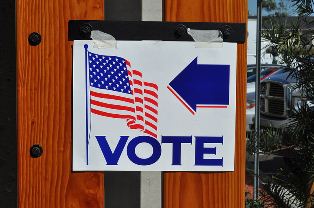 (CNN) -- Forty years ago, Balbino and Rosario Guevara didn't vote. It had nothing to do with Nixon's landslide or the electoral implosion of the Democratic Party; they were living in El Salvador. And they were simply afraid.
(CNN) -- Forty years ago, Balbino and Rosario Guevara didn't vote. It had nothing to do with Nixon's landslide or the electoral implosion of the Democratic Party; they were living in El Salvador. And they were simply afraid.
"I had two businesses: a restaurant and store. But then, the politics took a turn for the worse. ... People, even teachers, were being kidnapped. It was terrible," Balbino Guevara said. "I told my wife, 'I don't like this. We need to leave.' "
The Guevaras watched helplessly as the country hurtled toward a brutal civil war. They fled to the United States in the early '70s, and suddenly, the ballot box became a key part of their identity.
"The first thing we did after we became U.S. citizens was go to the town hall and register to vote," Rosario Guevara said proudly in her native Spanish. "And we have voted at every single election since."
The Guevaras became naturalized citizens and embraced voting in a way that was denied their countrymen in El Salvador, hit by electoral violence and fraud and a coup amid the bloody civil war.
"It's very important to vote. Very, very important," Rosario said. "I always tell my two daughters to vote, but they don't listen to me."
She has been voting since 1992, and her husband cast his first ballot in the following presidential election in 1996. "We even vote in our local town elections," said Rosario Guevara, who now lives in West New York, New Jersey, across the Hudson River from Manhattan.
But that passion isn't always shared by other Latinos. Balbino Guevara believes that one reason why Latinos vote in smaller proportions to other population groups is the lingering memories of fellow immigrants of what went on in the old country.
"They probably think that the voting process is going to be just like it is in our home countries. For example, in my country, I didn't vote," he said. "It didn't matter if I did or not; they already knew who was going to win the election without my vote."
The memory of life El Salvador -- even though he left before the worst rampages of the government death squads and the violence that killed, by some estimates, about 75,000 people -- is still enough to make Balbino shake his head and close his eyes.
He couldn't wait to leave, even though it meant separation from his wife and baby daughter and having to pay a "coyote" to smuggle him across the Mexican border.
Rosario Guevara was able to reunite with her husband in Brooklyn, New York, a year after he left. She hadn't wanted to leave. "I was 29 years old when I left. ... I was very young and scared. I didn't know what to expect. We once dreamed of going back to El Salvador when we retired, but our life is here now."
Back in El Salvador, Balbino, 77, was a teacher but then became a small-business owner. When he arrived in the U.S., he worked as a porter in a high-rise building in New Jersey and then as a janitor at a Jersey City hospital. Rosario, 75, was a nurse in her home country but worked as a housekeeper to get her residency.
The couple had another daughter and were finally able to bring their elder child to the United States in 1979.
They say they came to the U.S. for a chance at a better life. Evidence of how that life has played out is displayed on the walls of their home. In their bedroom, photos of their wedding and their granddaughter's quinceañera hang alongside their framed certificates of citizenship, his adorned with a white rosary.
Come November 6, the Guevaras will be doing as they have for past election days: waking very early, picking up Rosario's brother and any others they've persuaded to vote, and heading off to the polls.
West New York - their home for 35 years - is an immigrant hub, with the third-highest percentage of Hispanics in New Jersey. About 78% of the residents are Hispanic, and they add up to 2.5% of the state's Latino population, the 2010 Census found.
And the Guevaras have a message for their neighbors and any other Latino immigrants who do not vote. "Maybe in your country, your vote didn't matter, but it does matter here, so you should vote," Balbino Guevara said.
"It's like those people that complain about the prices of goods rising," he said with a laugh. "Well then, you should have voted if you wanted a say."
But Mitt Romney and others on the GOP ticket do not appear to have much of a chance of winning the Guevara vote, with Balbino declaring, "We always vote for the Democratic Party."
- Home
- News
- Opinion
- Entertainment
- Classified
- About Us
 MLK Breakfast
MLK Breakfast- Community
- Foundation
- Obituaries
- Donate
04-23-2024 2:21 am • PDX and SEA Weather






















































































































































































































































































































